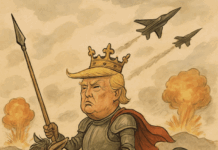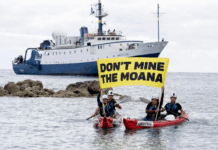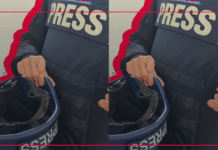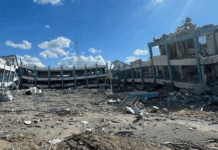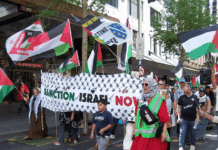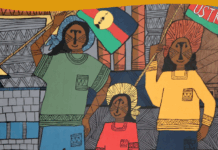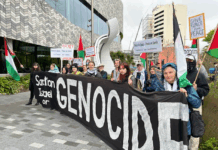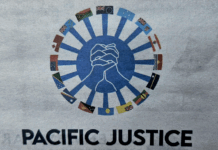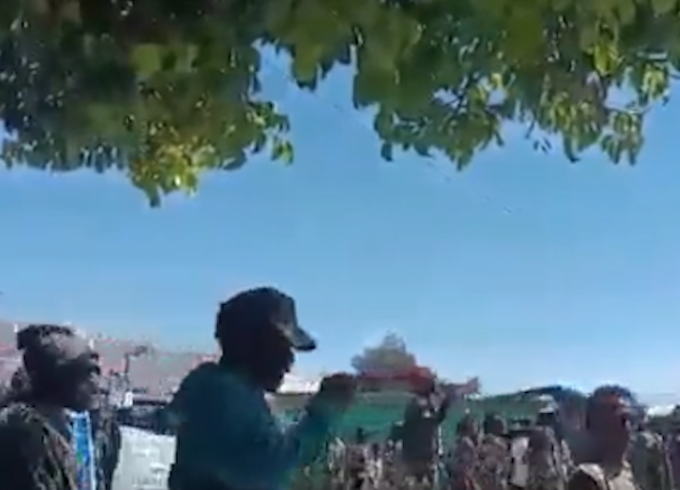
COMMENTARY: By Yamin Kogoya
A flurry of peaceful rallies and protests erupted in West Papua and Indonesia on Friday, June 3.
Papuan People’s Petition (PRP), the National Committee for West Papua (Komite Nasional Papua Barat-KNPB) and civil society groups and youth from West Papua marched in protest of Jakarta’s plan to create more provinces.
Thousands of protesters marched through the major cities and towns in each of West Papua’s seven regions, including Jayapura, Wamena, Paniai, Sorong, Timika/Mimika, Yahukimo, Lanny Jaya, Nabire, and Merauke.
As part of the massive demonstration, protests were organised in Indonesia’s major cities of West Java, Central Jakarta, Jogjakarta, Bandung, Semarang, Surabaya, and Bali.
Demonstrators said Papuans wanted an independence referendum, not new provinces or special autonomy.
3/6/22 Wamena, West Papua
“Papua: freedom!”
“Referendum: yes!”Thousands of protestors are rejecting Jakarta’s arbitrary plan to create new provinces and Special Autonomy status. They are demanding an independence referendum. pic.twitter.com/QnxBu8egHp
— Veronica Koman 許愛茜 (@VeronicaKoman) June 3, 2022
According to Markus Haluk, one of the key coordinators of the United Liberation Movement for West Papua (ULMWP), almost all Papuans took to the streets to show Jakarta and those who want to wipe out the Papuan people that they do not need special autonomy or new provinces.
[CW: blood]
This student protestor is the embodiment of West Papuan spirit. Indonesian forces beat him bloody but he will not be silenced.
Jayapura, 3/6/22 pic.twitter.com/knWxevAPvJ
— Veronica Koman 許愛茜 (@VeronicaKoman) June 3, 2022
Above is a text image that captures the spirit of the demonstrators. A young man is shown being beaten on the head and blood running down his face during a demonstration in Jayapura city of Papua on Friday.
The text urges Indonesia’s president Jokowi to be tagged on social media networks and calls for solidarity action.
Numerous protesters were arrested and beaten by Indonesian police during the demonstration.
Security forces brutalised demonstrators in the cities of Sorong, Jayapura, Yahukimo, Merauke, and elsewhere where demonstrations were held.
Hi Prof. Dr. MAHFUD….. where you get 82% people of West Papua supporting your government’s DOB and Otsus Jilid Il?
Even in these pictures can tell you the real fact that 99, 99% of indigenous West Papuans REJECTED your DOB and the Otonomi Jilid Il. pic.twitter.com/e9SS1QTi71— WestPapua_SUN (@WestPapua_SUN) June 3, 2022
An elderly mother is seen been beaten on the head during the demonstration in Sorong. Tweet: West Papua Sun
People who are beaten and arrested are treated inhumanely and are not followed up with proper care, nor justice, in one of Asia-Pacific’s most heavily militarised areas.
Among those injured in Sorong, these people have been named Aves Susim (25), Sriyani Wanene (30), Mama Rita Tenau (50), Betty Kosamah (22), Agus Edoway (25), Kamat (27), Subi Taplo (23), Amanda Yumte (23), Jack Asmuru (20), and Sonya Korain (22).
Root of the protests in the 1960s
The protests and rallies are not merely random riots, or protests against government corruption or even pay raises. The campaign is part of decades-old protests that have been carried out against what the Papuans consider to be an Indonesian invasion since the 1960s.
The Indonesian government claims West Papua’s fate was sealed with Indonesia after a United Nations-organised 1969 referendum, known as the Pepera or Act of Free Choice, something Papuans consider a sham and an Act of No Choice.
In spite of Indonesia’s claim, the Indonesian invasion of West Papua began in 1963, long before the so-called Act of Free Choice in 1969.
It was well documented that the 1025 Papuan elders who voted for Indonesian occupancy in 1969 were handpicked at gunpoint.
In the six years between 1963 and 1969, Indonesian security forces tortured and beat these elders into submission before the vote in 1969 began.
Friday’s protesters were not merely protesting against Jakarta’s draconian policy of drawing yet another arbitrary line through Papuan ancestral territory, but also against Indonesia’s illegal occupation.
The Papuans accuse Jakarta of imposing laws, policies, and programmes that affect Papuans living in West Papua, while it is illegally occupying the territory.
Papuans will protest indefinitely until the root cause is addressed. On the other hand, the Indonesian government seems to care little about what the Papuans actually want or think.
Markus Haluk said Indonesia did not view Papuans as human beings equal to that of Indonesians, and this mades them believe that what Papuans want and think, or how Jakarta’s policy may affect Papuans, had no value.
Jakarta, he continued, will do whatever it wants, however, it wishes, and whenever it wishes in regard to West Papua.
In light of this sharp perceptual contrast, the relationship between Papuans and the Indonesian government has almost reached a dead end.
Fatal disconnect
The Lowy Institute, Australia’s leading think-tank, published an article entitled What is at stake with new provinces in West Papua? on 28 April 2022 that identifies some of the most critical terminology regarding this dead-end protracted conflict — one of which is “fatal disconnect”.
The conclusion of the article stated, “On a general level, this means that there is a fatal disconnect between how the Indonesian government view their treatment of the region, and how the people actually affected by such treatment see the arrangement.”
It is this fatal disconnect that has brought these two states — Papua and Indonesia — to a point of no return. Two states are engaged in a relationship that has been disconnected since the very beginning, which has led to so many fatalities.
The author of the article, Eduard Lazarus, a Jakarta-based journalist and editor covering media and social movements, wrote:
That so many indigenous West Papuans expressed their disdain against renewing the Special Autonomy status … is a sign that something has gone horribly wrong.
The tragedy of this irreconcilable relationship is that Jakarta does not reflect on its actions and is willfully ignorant of how its rhetoric and behaviour in dealing with West Papua has caused such human tragedy and devastation spanning generations.
The way that Jakarta’s leaders talk about their “rescue” plans for West Papua displays this fatal disconnect.
Indonesian Vice-President’s plans for West Papua
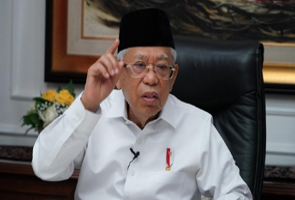
KOMPAS.com reported on June 2 that Vice-President Ma’ruf Amin had asked Indonesian security forces to use a “humanist approach” in Papua rather than violence.
Ma’ruf expressed this view also in a virtual speech made at the Declaration of Papua Peace event organised by the Papuan Indigenous Peoples Institute on June 6.
In a press release, Ma’ruf said he had instructed the combined military and police officials to use a humanist approach, prioritise dialogical efforts, and refrain from violence.
Ma’ruf believes that conducive security conditions are essential to Papua’s development, and that the government aims to promote peace and unity in Papua through various policies and regulations.
The Papua Special Autonomy Law, he continued, regulates the transfer of power from provinces to regencies and cities, as well as increasing the percentage of Papua Special Autonomy Funds transferred to 2.25 percent of the National General Allocation Fund.
Additionally, according to the Vice-President, the government is drafting a presidential regulation regarding a Papuan Development Acceleration Master Plan (RIPPP) and establishing the Papuan Special Autonomy Development Acceleration Steering Agency (BP3OKP) directly headed by Ma’ruf himself.
He also underscored the importance of a collaboration between all parties, including indigenous Papuans. Ma’ruf believes that Papua’s development will speed up soon since the traditional leaders and all members of the Indigenous Papuan Council are willing to work together and actively participate in building the Land of Papua.
Indonesia’s new military commander
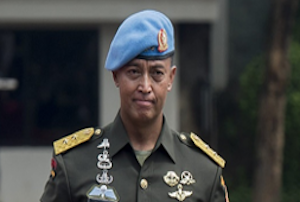
Recently, Indonesia’s newly appointed Commander of Armed Forces, General Andika Perkasa, proposed a novel, humanistic approach to handling political conflict in West Papua.
Instead of removing armed combatants with gunfire, he has vowed to use “territorial development operations” to resolve the conflict. In these operations, personnel will conduct medical, educational, and infrastructure-building missions to establish a rapport with Papuan communities in an effort to steer them away from the independence movement.
In order to accomplish Perkasa’s plans, the military will have to station a large number of troops in West Papua in addition to the troops currently present.
When listening to these two countries’ top leaders, they appear full of optimism in the words and new plans they describe.
But the reality behind these words is something else entirely. There is, as concluded by Eduard Lazarus, a fatal disconnect between West Papuan and Jakarta’s policymakers, but Jakarta is unable to recognise it.
Jakarta seems to suffer from cognitive dissonance or cognitive disconnect when dealing with West Papua — a lack of harmony between its heart, words, and actions.
Cognitive dissonance is, by definition, a behavioural dysfunction with inconsistency in which the personal beliefs held, what has been said, and what has been done contradict each other.
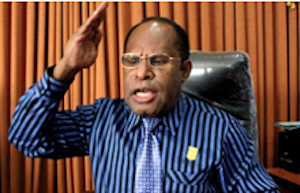
This contradiction, according to Yunus Wonda, deputy chair of the Papuan People’s Representative Council, occurs when the government changes the law and modifies and amends it as they see fit.
What is written, what is practised, and what is in the heart do not match. Papuans suffer greatly because of this, according to Yunus Wonda.
Mismanagement of a fatalistic nature
Jakarta continues to mismanage West Papua with fatalistic inconsistent policies, which, according to the article, “might already have soured” to an irreparable degree.
The humanist approach now appears to be another code in Indonesia’s gift package, delivered to the Papuans as a Trojan horse.
The words of Indonesia’s Vice-President and the head of its Armed Forces are like a band aid with a different colour trying to cover an old wound that has barely healed.
According to Wonda, the creation of new provinces is like trying to put the smoke out while the fire is still burning.
Jakarta had already tried to bandage those old wounds with the so-called “Special Autonomy” 20 years ago. The Autonomy gift was granted not out of goodwill, but out of fear of Papuan demands for independence.
However, Jakarta ended up making a big mess of it.
The same rhetoric is also seen here in the statement of the Vice-President. Even though the semantic choices and construction themselves seem so appealing, this language does not translate into reality in the field.
This is the problem — something has gone very wrong, and Jakarta isn’t willing to find out what it is. Instead, it keeps imposing its will on West Papua.
Jakarta keeps preaching the gospel of development, prosperity, peace, and security but does not ask what Papuans want.
The 2001 Special Autonomy Law was supposed to allow Papuans to have greater power over their fate, which included 79 articles designed to protect their land and culture.
Furthermore, under this law, one important institution, the Papuan People’s Assembly (Majelis Rakyat Papua-MRP), together with provincial governments and the Papuan People’s Representative Council (Dewan Perwakilan Rakyat Papua-DPRP), was given the authority to deal with matters that are most important to them, such as land, population control, cultural identity, and symbols.
Section B of the introduction part of the Special Autonomy law contains the following significant provisions:
That the Papua community is God’s creation and is a part of a civilised people, who hold high human rights, religious values, democracy, law and cultural values in the adat (customary) law community and who have the right to fairly enjoy the results of development.
Three weeks after these words were written into law, popular independence leader Theys H. Eluay was killed by Indonesian special forces (Kopassus). Ryamizard Ryacudu, then-army chief-of-staff, who in 2014 became Jokowi’s first Defence Minister, later called the killers “heroes” (Tempo.co, August 19, 2003).
In 2003, the Megawati Soekarnoputri government divided the province into two, violating a provision of the Special Autonomy Law, which was based on the idea that Papua remains a single territory. As prescribed by law, any division would need to be approved by the Papuan provincial legislature and MRP.
Over the 20 years since the Autonomy gift was granted, Jakarta has violated and undermined any legal and political framework it agreed to or established to engage with Papuans.
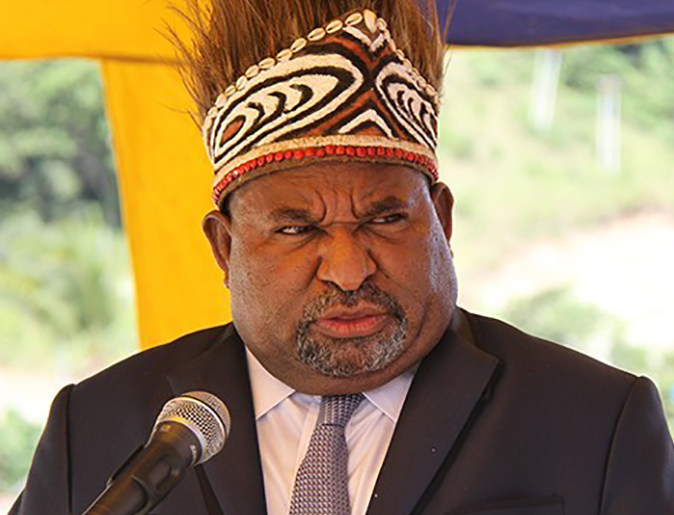
Papuan Indigenous leaders reject Jakarta’s band aid
On May 27, Governor Lukas Enembe of the settler province of Papua, told Reuters there were not enough resources to run new provinces and that Papuans were not properly consulted.
As the governor, direct representative of the central government, Enembe was not even consulted about the creation of new provinces.
Yunus Wonda and Timotius Murid, two Indigenous Papuan leaders entrusted to safeguard the Papuan people and their culture and customary land under two important institutions — the Papuan People’s Assembly (Majelis Rakyat Papua-MRP) and People’s Representative Council (Dewan Perwakilan Rakyat Papua-DPRP) — were not consulted about the plans.
Making matters worse, Jakarta stripped them of any powers they had under the previous autonomous status, which set the precedent for Jakarta to amend the previous autonomous status law in 2021.
This amendment enables Jakarta to create new provinces.
The aspirations and wishes of the Papuan people were supposed to be channelled through these two institutions and the provincial government, but Jakarta promptly shut down all avenues that would enable Papuans to have their voices heard.
Governor Enembe faces constant threats, terrorism
Governor Enembe has also been terrorised and intimidated by unknown parties over the past couple of years. He said, “I am an elected governor of Indonesia, but I am facing these constant threats and terror. What about my people? They are not safe.”
This is an existential war between the state of Papua and the state of Indonesia. We need to ask not only what is at stake with the new provinces in West Papua, but also, what is at stake in West Papua under Indonesia’s settler-colonial rule?
Four critical existential issues facing West Papua
There are four main components of Papuan culture at stake in West Papua under Indonesia’s settler-colonial rule:
1. Papuan humans
2. Papuan languages
3. Papuan oral cultural knowledge system
4. Papuan ancestral land and ecology
Papua’s identity was supposed to be protected by the Special Autonomy Law 2001.
However, Jakarta has shown no interest or intention in protecting these four existential components. Indonesia continues to amend, create, and pass laws to create more settler-colonial provincial spaces that threaten Papuans.
The end goal isn’t to provide welfare to Papuans or protect them, but to create settlers’ colonial areas so that new settlers — whether it be soldiers, criminal thugs, opportunists, poor improvised Indonesian immigrants, or colonial administrators — can fill those new spaces.
Jakarta is, unfortunately, turning these newly created spaces into new battlegrounds between clans, tribes, highlanders, coastal people, Papua province, West Papua province, families, and friends, as well as between Papuans and immigrants.
Media outlets in Indonesia are manipulating public opinion by portraying one leader as a proponent of Jakarta’s plan and the other as its opponent, further fuelling tension between leaders in Papua.
Yamin Kogoya is a West Papuan academic who has a Master of Applied Anthropology and Participatory Development from the Australian National University and who contributes to Asia Pacific Report. From the Lani tribe in the Papuan Highlands, he is currently living in Brisbane, Queensland, Australia.


